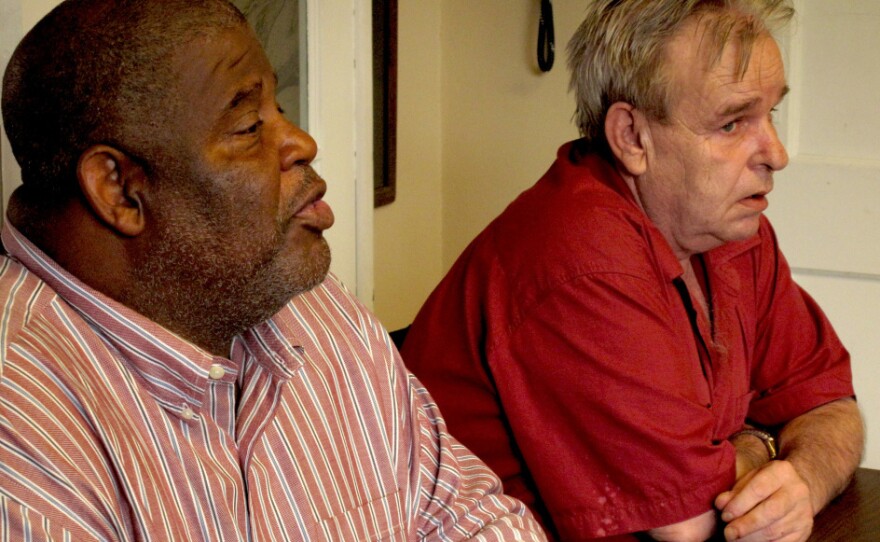The typical speakers bureau can get a celebrity, a politician or a media pundit to address your group for a few thousand, or maybe tens of thousands of dollars. But one speakers bureau made up of men and women who have been homeless will provide someone for only $40.
And the speech could be just as compelling as one given by high-priced talent.
John Harrison is one of those speakers. With his ruddy good looks, salt-and-pepper hair, khakis and white button-down shirt, he looks like someone who might spend a lot of time relaxing on a sailboat. Instead, he's still struggling to get back on his feet after years of homelessness.
He's addressing a Jewish youth group, part of a program organized by the PANIM Institute in Washington, D.C. The teens came into the room laughing and joking, but are soon mesmerized.
Harrison's message is clear: Almost anyone can become homeless, and people should be nice to those who are homeless.

"Seemed like all of a sudden, people walked by me like I wasn't even there," Harrison tells the group.
"I remember going into a restaurant to get what I called a 'two for one.' And the 'two for one' for the person experiencing homelessness is the warmth and the food for the price of the food. And so, I was optimistic. They took my order. But when they brought me my food, it was to go. Because that was the message. Go," he says.
Harrison, now in his mid-50s, says homelessness snuck up on him. He came from a good family and had a good job. But then came a series of unfortunate events, and some bad decisions, that set off his downward spiral.
He lost his job in a merger. He didn't have a college degree, so he had trouble finding another job. Then, his house burned down. He didn't have insurance, so he lived in a shed behind a friend's house for awhile. Then he lived in his car, until that broke down. Suddenly, he found himself without a home.
Harrison says it was the kindness of others that helped him survive.
"People ... reached out to me with genuine concern and said, 'Hey, how are you doing?' and meant it," he says. "You know, we don't have to empty our pockets every time we see a homeless person. But to offer a word of cheerful encouragement, instead of a hurtful comment — how hard is that?"
Harrison is one of 350 members of a speakers bureau run by the National Coalition for the Homeless. The coalition is an advocacy group, but the speakers' agenda is mostly educational. They address religious groups, universities, government agencies, and even medical schools to help new doctors learn how to treat the homeless, who frequent emergency rooms.
George Siletti is another speaker. He's one of three formerly homeless people who recently addressed a group of human rights fellows from Europe, who were in Washington, D.C., to work on Capitol Hill.
"I grew up in foster care. You know what foster care is?" he asks the group.
Siletti, 54, tells them he became homeless at age 16, when he was allowed to leave the boys' home where he lived. He had no money or food. Two weeks later, he was still sleeping in the woods behind the home.
"I had literally nothing. No life skills, no job skills, no nothing. So my life was just to survive on the streets," he says. "Well, this happened for 30 years of my life."
Siletti spent the time hitchhiking from job to job and state to state. He says he's been homeless in every state except Alaska. He eventually got help from a nonprofit, which gave him medicine to treat his mental illness and epilepsy, and finally a place to live.
Today, Siletti says, his name is in the phone book. He even gets junk mail. And he feels like part of the community.
"I am no longer [an] isolated homeless person. I am no longer called weird names--'crazy,' 'psycho' and all that. I'm called 'George,' and I feel well accepted," he says.
"This was fantastic," says Natalie Chwalisz, from Germany. She had tears in her eyes as she listened to the speakers tell their stories. "You're not used to seeing it in Europe," she says. "So it's hard to learn this and see how people just walk by."
The teenagers listening to Harrison also have questions about what life on the street is like.
"What were you thinking about as you were trying to fall asleep on the concrete?" asks one young man.
"Boy, that's easy," replies Harrison. "Nothing. Because I was so exhausted just getting through whatever day it was."
Harrison now has a place to live and two part-time jobs. He says his homelessness is in "remission."
He'll get $40 for this talk, but says what he really wants is for people to change how they see the homeless.
Copyright 2022 NPR. To see more, visit https://www.npr.org. 9(MDAzMjM2NDYzMDEyMzc1Njk5NjAxNzY3OQ001))







